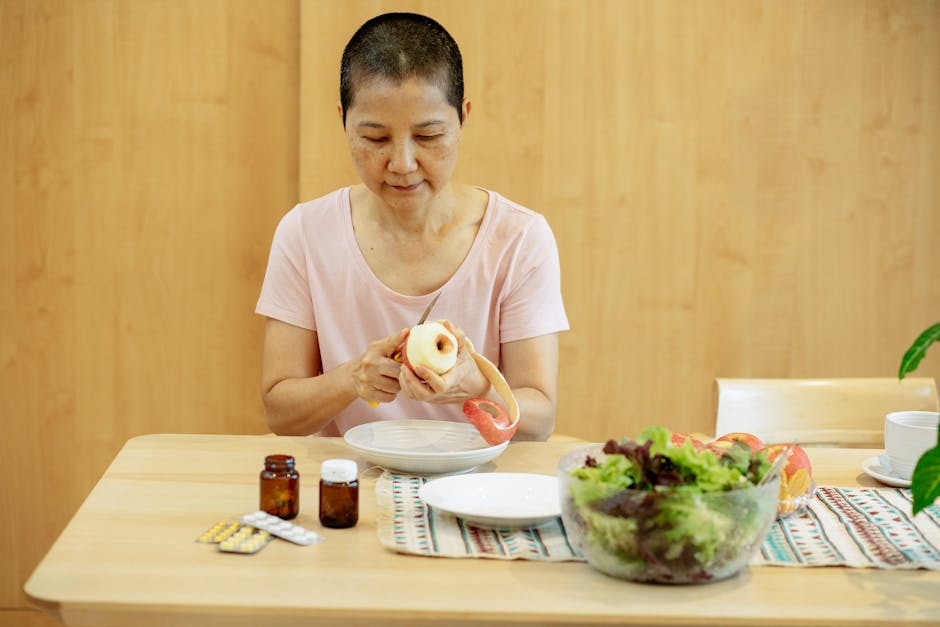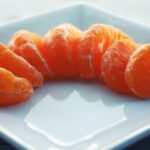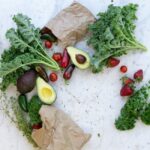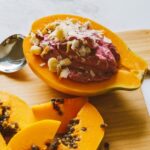Meals for Cancer Patients: What Not to Eat During Treatment
Understanding Nutrition for Cancer Patients
What Are Meals for Cancer Patients During Treatment?
During cancer treatment, you will need to change your meals to accommodate new nutritional needs and symptoms of your condition.
Healthy eating during cancer treatment requires changes to your diet and lifestyle. Cancer research has shown that a healthy diet can significantly reduce the side effects associated with cancer treatment and improve overall health.
In addition, cancer survivors also benefit from adjusting their weekly meal plans to reduce future cancer risk and strengthen their immune systems.
Some meals for cancer patients during treatment include:
- Plant-based proteins, such as lentil dishes
- Healthy fats
- Essential vitamins and minerals from whole foods
- Healthy carbs, such as whole-grain oat bread
An oncology nutritionist may provide additional dietary guidelines for you during cancer treatment and recovery.
How Does Cancer Treatment Affect Nutritional Needs?
Cancer treatments may cause nausea, loss of appetite, and digestive issues.
In addition, the body requires additional protein, calories, and specific nutritional support throughout treatment and recovery.
The type of treatment will affect how it impacts your diet, digestion, and nutritional needs. According to the National Cancer Institute, “Both cancer and cancer treatments may cause side effects that affect your taste, smell, appetite, and ability to eat enough food or absorb the nutrients from food.”
In addition, “When malnutrition is not managed in people having cancer treatment, it can lead to cancer cachexia [. . .] a wasting syndrome that can cause weakness, weight loss, and fat and muscle loss.”
Why Is Maintaining Strength and Immune Function Important During Cancer Care?
Cancer treatment suppresses the immune system, increases your risk of infection, and causes muscles to weaken.
Multiple forms of cancer treatment may cause muscle loss and a suppressed immune system. Prioritizing immune support and strength during treatment can help you avoid infection or other complications.
LifeSpring Home Nutrition delivers medically tailored, immune-boosting, and cancer support meals directly to your door every week.
Foods and Ingredients to Avoid
Which Foods Can Trigger Nausea, Vomiting, or Digestive Discomfort?
Overly sweet foods with added sugars, as well as spicy, high-fat, fried, or greasy foods, can trigger nausea or digestive discomfort.
You can eat bland foods to avoid nausea, vomiting, or digestive discomfort. Any foods with significant amounts of spice, grease, fat, sodium, or added sugars can cause stomach upset.
Everyone has different preferences and responses to foods during cancer treatment. You can work with a dietitian to create a meal plan that meets your nutritional needs while minimizing digestive issues.
Why Should Certain Raw or Hard-to-Chew Veggies Be Limited During Treatment?
Cancer treatment negatively impacts the immune system, and you have a higher risk of developing an infection from bacteria found on certain raw foods.
Some people with cancer may also have difficulty swallowing, making it essential to avoid hard-to-chew veggies.
Raw and hard-to-chew vegetables can increase your risk of infection or choking. Some people with specific cancers, like throat cancer, may find it challenging to swallow or chew hard foods. In addition, soft foods often feel more comfortable for people with digestive issues.
How Can High-Sugar, Highly Processed, or Greasy Foods Affect Recovery?
Processed, high-sugar, and greasy foods can cause inflammation and worsen the effects of cancer or cancer treatment.
Greasy, highly processed, and added-sugar foods can affect digestion, nutrient absorption, and overall wellness. Some research also indicates that ultra-processed foods increase the growth of cancer cells. Avoiding fresh, fatty, and sugary foods will keep you healthier during treatment and recovery.
Most of these foods are snacks, comfort foods, or favorite meals. You can work with a dietitian to replace these high-calorie foods with meals that support cancer recovery. For example, you can replace fried chicken with skinless, boneless chicken or chicken broth.
Are Certain Whole Grains, Oats, or Breadcrumbs Risky During Treatment?
Whole grains introduce fiber and nutrients into your diet during cancer treatment.
Although they are generally safe, you should always consult with your doctor to ensure your diet will not interfere with treatment or cause complications.
You need to ensure all foods, including breadcrumbs, oats, and other whole grains, come from a safe source and have been thoroughly cooked to avoid bacteria or other contaminants.
Bread crumbs, toast, and other crunchy items may be challenging to eat for individuals with certain forms of cancer. You should eat breads and whole grains that have been thoroughly cooked and carefully sealed to avoid contamination.
If you have sores in your mouth or throat, avoid scratchy foods, such as bread and breadcrumbs, as they may irritate these areas. You should consult a professional before adding anything new to your diet or if you feel uncertain about which foods to continue eating.
Should Some Supplements Be Avoided or Used With Caution?
Yes, some supplements may cause unwanted interactions with cancer treatment, lowering the effectiveness of cancer medications.
Many people use supplements to build muscle, boost energy, prevent vitamin deficiencies, and provide other forms of dietary support. However, people in treatment for cancer should stop taking supplements until they can discuss them with their doctor. Your treatment will determine whether you can continue taking supplements.
Some cancer medications interact badly with supplements, and it may be dangerous to mix the two without professional guidance and oversight. You can speak with your primary care provider, oncology nutritionist, dietitian, or another expert to determine if you should stop taking your supplements during treatment for cancer.
Meal Planning Strategies During Treatment
How Can Meals Be Adapted for Taste Changes and Appetite Loss?
You may benefit from eating smaller meals throughout the day to address appetite loss, and from using various toppings, sauces, or marinades to enhance the taste of your food.
Loss of appetite and changes in taste are common side effects of cancer treatment. LifeSpring Home Nutrition has a wide range of delicious foods that support ongoing healing and cancer treatment.
What Are Gentle, Easy-to-Swallow Foods That Provide Adequate Nutrition?
Pureed meals offer nutrients and reduce the risk of choking or stomach upset for people struggling with side effects of cancer treatment.
Soft vegetables, puddings, jello, soup, smoothies, and other easy-to-swallow foods provide essential vitamins and minerals. LifeSpring Home Nutrition offers pureed meals designed to support people healing from cancer.
How Can Caregivers Support Safe and Nutritious Meal Preparation?
A caregiver should collaborate closely with your medical care team to ensure they provide safe and nutritious meals.
Caregivers have to balance nutrition and safety with a person’s preferences and their own cooking skills. Home-delivered meals from LifeSpring Home Nutrition make this process simple by offering premade, cancer support meals for people in treatment or recovery.
How Can Protein-Rich Foods Like Lentils, Quinoa, and Soft Dairy Be Included Safely?
You should gradually introduce high-fiber foods and proteins into your meal plan to avoid stomach upset.
After starting cancer treatment, gradually introduce lean proteins and soft dairy into your diet. By slowly adding these foods into your meal plan, you can allow your body to acclimate and avoid experiencing unwanted side effects, such as nausea or digestive issues.
How Can Hydration and Balanced Fluids Support Treatment and Recovery?
Staying properly hydrated supports treatment and recovery by reducing the risk of complications or side effects caused by nutritional deficiencies or dehydration.
Hydration helps the body absorb essential vitamins and minerals from the foods you eat. Drinking the recommended amount of fluids each day protects your body by ensuring you avoid dehydration or other side effects caused by a lack of proper hydration.
You must be careful to drink only safe fluids. According to MedlinePlus, “During and right after your cancer treatment, your body may not be able to protect itself against infections. Germs can be in water, even when it looks clean.” You can use bottled water or water filters to reduce your risk of developing an infection due to bacteria in water sources.
Sample Meals for Cancer Patients
What Are Breakfast Options That Are Easy on the Stomach?
Yogurt, pudding, oatmeal, and some cereal are easy on the stomach and provide energy for your day.
Quick oats, whole-grain toast, Greek yogurt, apple sauce, parfaits, and soft fruits make an excellent breakfast. Specific dietary limitations or guidelines might impact what types of breakfast foods you can eat. For example, if you struggle to chew or swallow, then cereal, toast, and other crunchy foods may be more challenging to eat.
How Can Lunch Include Gentle Proteins and Soft Vegetables?
Baked or cooked vegetables soften, making them easier to chew and swallow.
Almost any vegetable can be baked or cooked into a soft, healthy meal that provides a rich source of vitamins and minerals. The softness of the vegetables also makes them ideal for people struggling with chewing or swallowing.
Many healthy recipes for cancer support also include plant-based proteins, such as lentils, to strengthen the body and provide energy. Adding gentle proteins like beans and lentils to your meal of soft vegetables can strengthen muscles and repair cells.
What Are Snack Ideas for Energy, Immunity, and Easy Eating?
Healthy smoothies or shakes, nuts and seeds, colorful vegetables, and dairy or dairy alternatives can make easy snacks that boost energy and support the immune system.
Muscle weakness, chronic fatigue, and an inhibited immune system can interfere with your treatment and recovery. You can personalize your meal plans to specific dietary guidelines and needs. For example, you may introduce nuts and berry snacks to add protein, antioxidants, and essential nutrients.
How Can Dinner Include Balanced Portions Without Triggering Side Effects?
Small portion sizes and bland, easy-to-digest foods allow you to eat a balanced diet with minimal side effects.
Smaller dinner portions make it easier for you to avoid triggering side effects, such as nausea or vomiting. A variety of foods and food groups give you a balanced diet without causing stomach upset or other side effects. Pureed foods, soft foods, gentle proteins, and other easy-to-eat meals help you to maintain a varied diet while minimizing complications.
Can Comfort Foods Like Risotto or Spaghetti Squash Be Modified for Safety?
Yes, you can safely eat carefully prepared and cooked risotto or spaghetti squash during cancer treatment and recovery.
All produce must be carefully cleaned to avoid food contamination, and all foods must be fully cooked to ensure you can safely eat them.
Some people may have very limited diets due to complications related to their condition or co-occurring health issues. Always consult with a medical professional before adding foods to your diet during cancer treatment.
Working With Health Professionals
When Should Cancer Patients Consult Registered Dietitians or Oncology Nutritionists?
You should consult with an oncology nutritionist or dietitian as quickly as possible after receiving your diagnosis, giving you more time to develop and transition into a new cancer diet.
Diet impacts all stages of cancer treatment and recovery. You should consult with a dietitian or nutritionist quickly to ensure your diet does not cause complications or reactions with the medications.
LifeSpring Home Nutrition provides fully tailored meals to clients experiencing medical issues, including cancer.
How Can Nutrition Counseling Improve Side Effect Management and Recovery?
Nutrition counseling can help you easily troubleshoot dietary challenges during cancer treatment and recovery.
A nutritionist or dietitian can provide insights into how the body functions and the impact of diet on your overall health. The more you understand about the connections between diet and cancer recovery, the easier you will find it to stick with a healthy meal plan.
What Resources Exist Through the American Cancer Society or Cancer Support Communities?
The cancer support community has a lot of resources to offer, including referrals to various community-based services and peer support.
Community-based groups and organizations offer support groups, cancer education, and other resources for caregivers and people diagnosed with cancer. The American Cancer Society also offers information on cancer prevention and recovery.
Additionally, your healthcare provider can provide information on specific services or programs that you may benefit from.
FAQs
Are there foods cancer patients should avoid after treatment?
You should avoid ultra-processed foods, red meats, and sugary drinks after treatment.
Processed meats, red meats, added sugars, high-fat foods, and high-sodium foods increase your risk of experiencing cancer recurrence. You can ask a dietitian or your primary care doctor for a list of specific foods to avoid during and after cancer treatment.
How can taste changes be managed while maintaining adequate nutrition?
Often, people experiment with various sauces, dressings, marinades, and toppings to improve the taste of their food during treatment.
Everyone has different taste preferences. Some people may notice significant changes to what they find palatable during treatment. Experimenting with various taste enhancers can help you identify what you like and dislike during treatment.
Can certain foods help reduce recurrence risk or support survivorship?
Yes, certain foods like vegetables, fruits, lean proteins, and whole grains reduce your risk of cancer recurring and improve your overall health.
Cancer can recur for some people. Maintaining a balanced diet that eliminates processed foods and replaces them with whole foods or other healthy alternatives can reduce your risk and strengthen your body.
How can caregivers balance safety, taste, and nutritional needs?
Balancing nutritional needs with personal meal preferences may involve extensive experimentation, and caregivers benefit from consulting a dietitian or other medical professional to ensure they maintain a balanced meal plan while catering to specific tastes.
Caregivers have to balance providing emotional and practical support to those in their care. Often, this involves trying different meal options to discover which combinations of foods provide the best nutrients while also giving the person undergoing treatment a positive experience.
Meals can provide comfort and enjoyment if caregivers strike a balance among taste, nutrition, and the avoidance of treatment side effects.
Can physical activity be combined with meal planning for recovery and wellness?
Yes, you can combine gradually increasing physical activity with healthy meal planning to reduce your risk of complications during cancer treatment and recovery.
Cancer treatment causes muscle weakness and atrophy. Gradually increasing physical activity under a medical professional’s supervision and adjusting your diet to support the additional activity will help you heal more quickly.
Cancer impacts millions of families each year in America, and cancer treatment can significantly impact a person’s diet. LifeSpring Home Nutrition offers cancer support meal delivery to help you maintain a safe and nutritional meal plan during the treatment and recovery process. To learn more about our services and cancer support resources, call our office today at (800) 798-5767.
 Call To Order
Call To Order



















